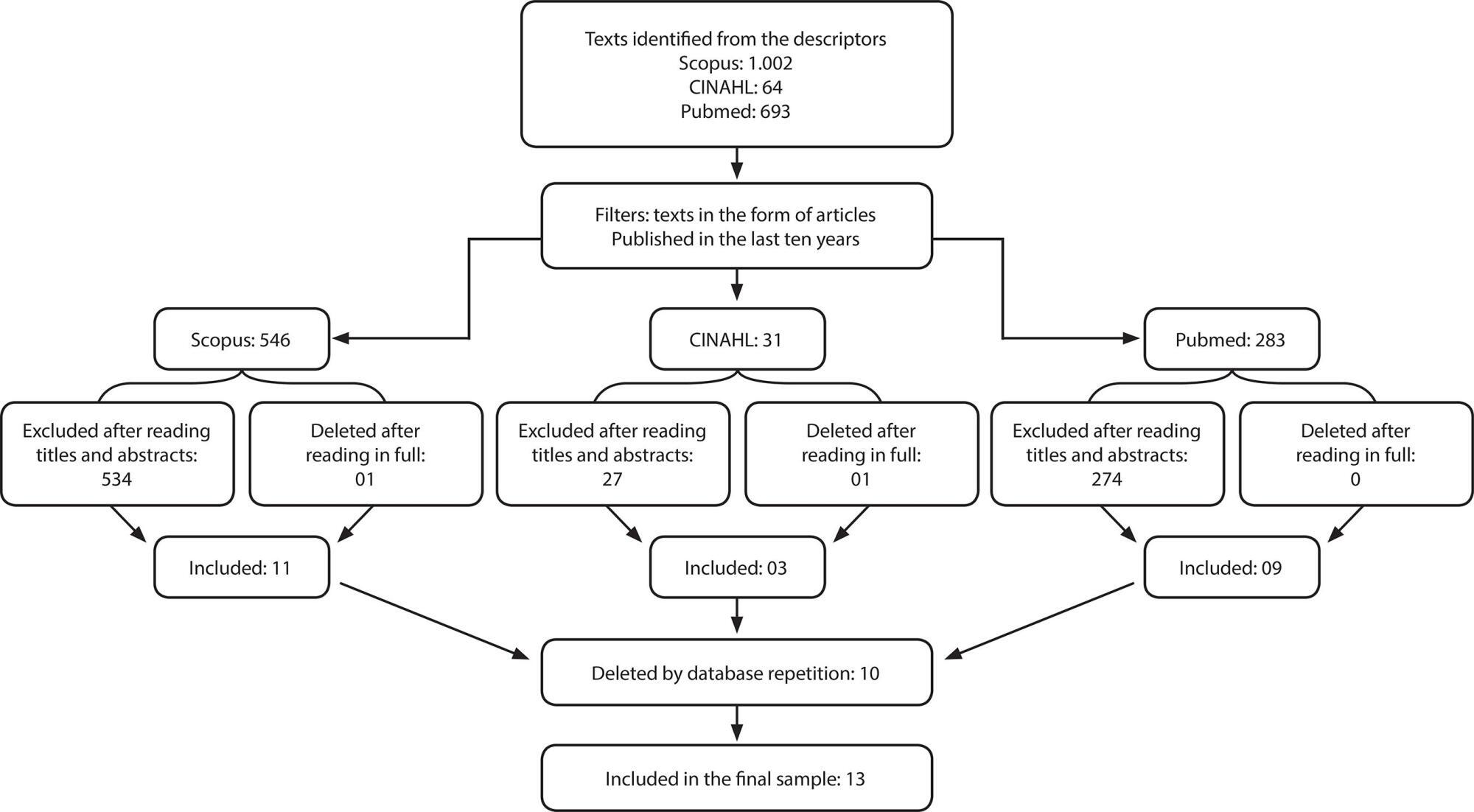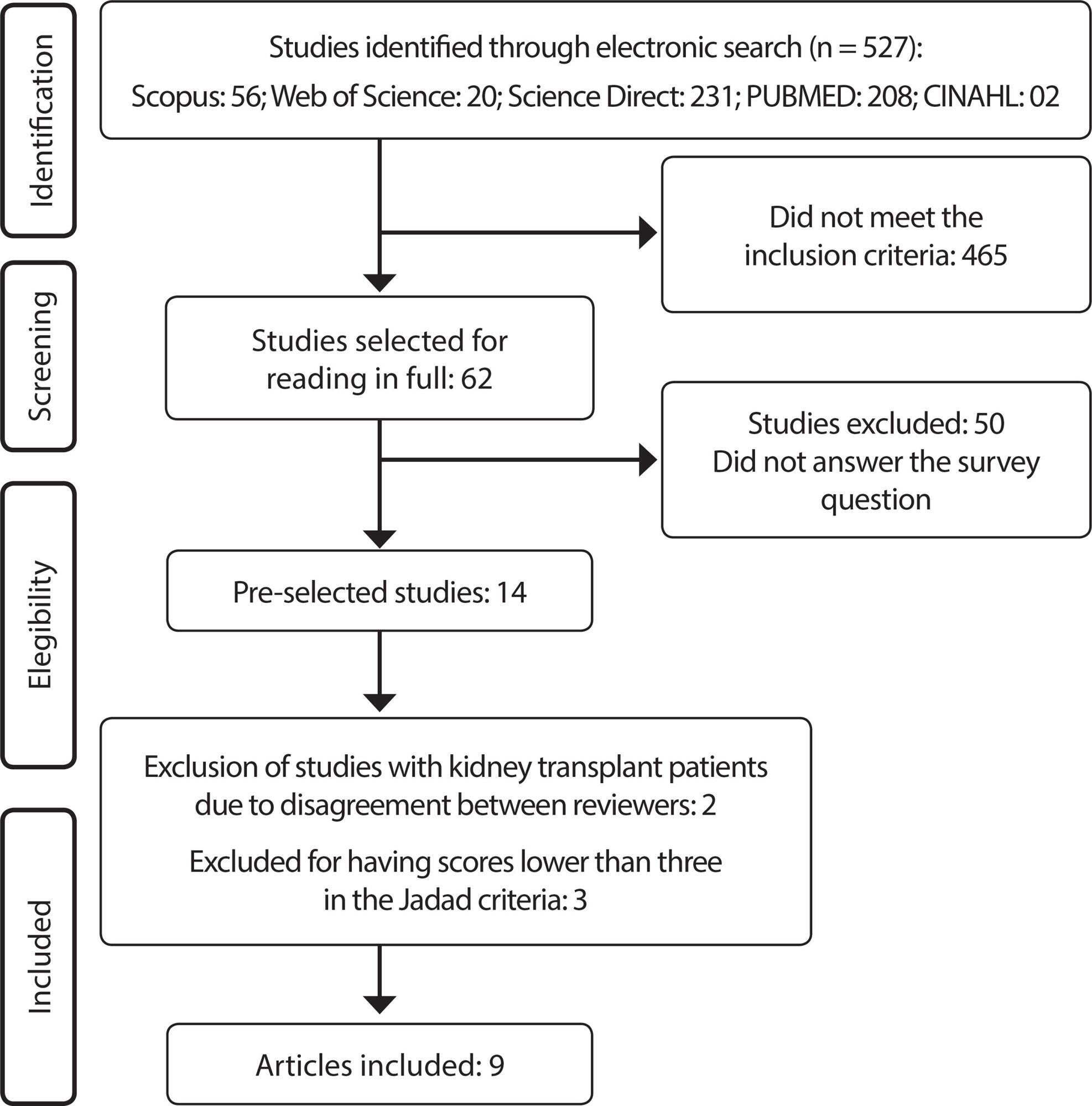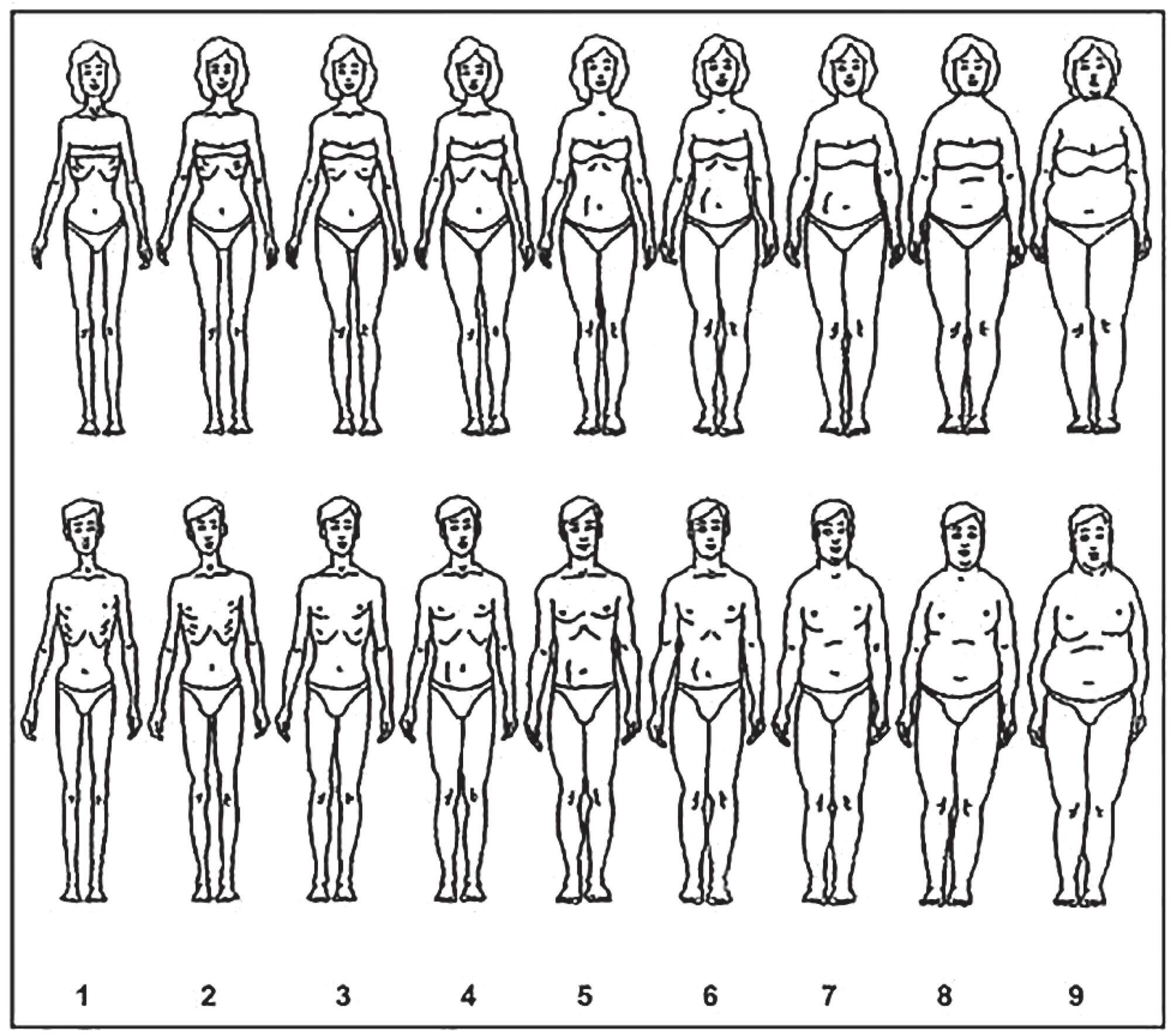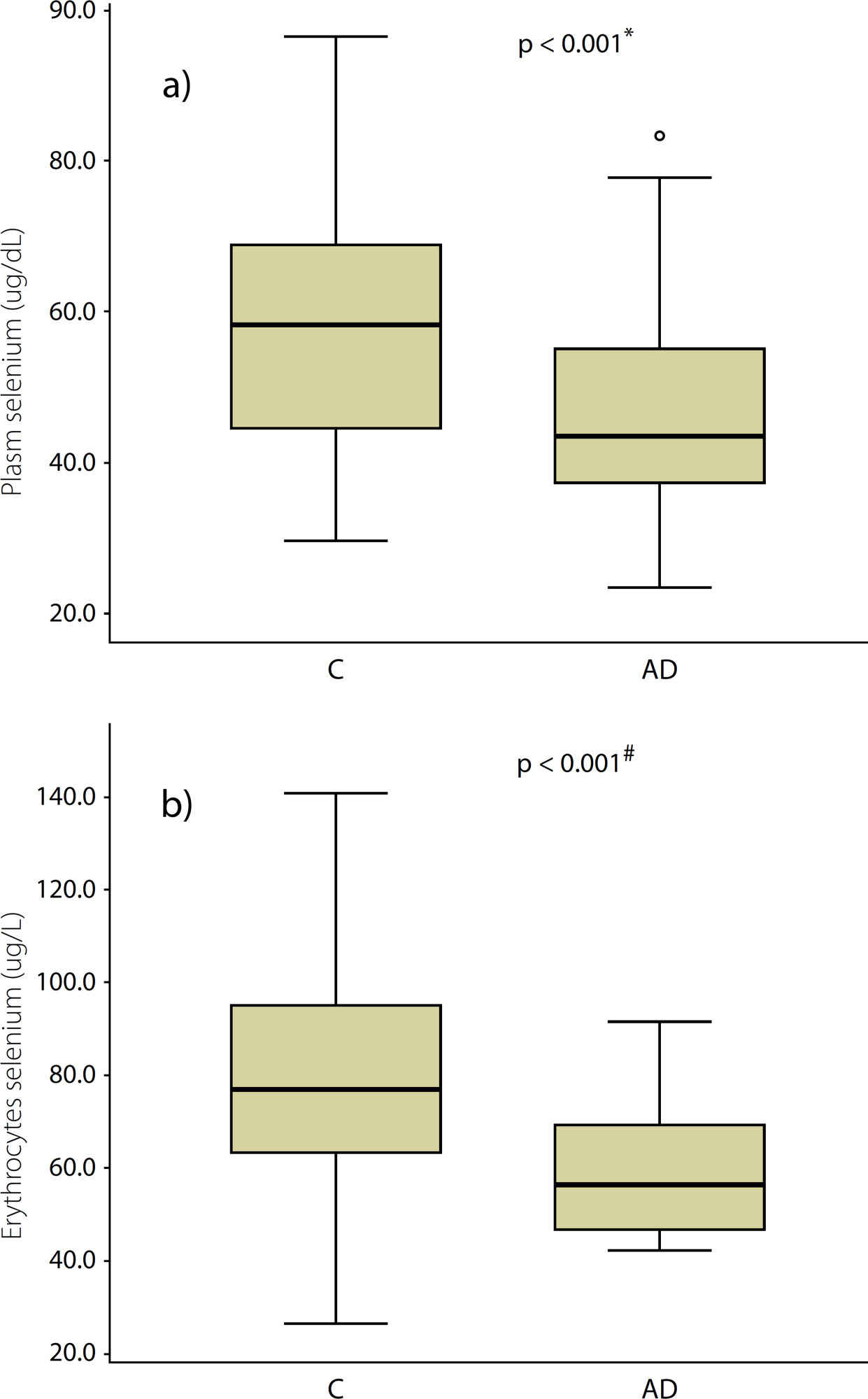-
EDITORIAL
Discoveries of Biological Sciences and their implications for nursing practice
Revista Brasileira de Enfermagem. 2016;69(4):619-620
01-01-2016
Abstract
EDITORIALDiscoveries of Biological Sciences and their implications for nursing practice
Revista Brasileira de Enfermagem. 2016;69(4):619-620
01-01-2016DOI 10.1590/0034-7167.2016690401i
Views0For the longest time, the production of knowledge in the field of biological sciences was viewed as the exclusive responsibility and competence of medical professionals. This scenario has changed in light of the worldwide trend of improvements in other health professions, which includes the need to implement the use of evidence-based methodology in nursing practice. […]See more -
REVIEW
Effects from acupuncture in treating anxiety: integrative review
Revista Brasileira de Enfermagem. 2016;69(3):602-609
01-01-2016
Abstract
REVIEWEffects from acupuncture in treating anxiety: integrative review
Revista Brasileira de Enfermagem. 2016;69(3):602-609
01-01-2016DOI 10.1590/0034-7167.2016690325i
Views0See moreABSTRACT
Objective:
to evaluate the scientific evidence that is available in the literature on the effects of acupuncture for treating anxiety and on the quality of such studies.
Method:
the study is an integrative review of CINAHL, LILACS, PUBMED-PICO, SciELO, and The Cochrane Library between 2001 and 2014. Keywords anxiety, acupuncture therapy, acupuncture, and anxiety disorders were combined among themselves to ensure a wide search of primary studies.
Results:
among 514 articles, 67 were selected to be fully read and 19 were included. Among these, 11 were found to have strong evidence levels. Among the six articles about randomized clinical studies, five were found to be of reasonable quality. Two studies used acupuncturist nurses to perform their interventions. Its results showed positive and statistically significant effects from using acupuncture for treating subjects with anxiety.
Conclusion:
acupuncture seems to be a promising treatment for anxiety; however, there is a need for improving the methodological quality of the research on this field.
-
REVIEW
Palliative care and spirituality: an integrative literature review
Revista Brasileira de Enfermagem. 2016;69(3):591-601
01-01-2016
Abstract
REVIEWPalliative care and spirituality: an integrative literature review
Revista Brasileira de Enfermagem. 2016;69(3):591-601
01-01-2016DOI 10.1590/0034-7167.2016690324i
Views0See moreABSTRACT
Objective:
to analyze scientifi c articles published in international online journals about palliative care and spirituality.
Methods:
an integrative literature review with data collected in September 2014 from the LILACS, SCIELO, MEDLINE/PubMed, and IBECS databases.
Results:
thirty-nine publications were identifi ed and their textual analysis facilitated through four thematic approaches: the meaning of spirituality in the context of palliative care; palliative care and spiritual support; spirituality and relief of pain and other symptoms in patients under palliative care; and instruments to evaluate the spiritual dimension of the scope of palliative care.
Conclusion:
this study examined the relevance of the spiritual dimension in the care of patients with palliative care and the need for developing new studies to disseminate knowledge about this topic.
Descriptors:
Palliative Care; Palliative Care at End of Live; Spirituality; Religion; Health.
-
REVIEW
Educational technologies to encourage (self) care in postpartum women
Revista Brasileira de Enfermagem. 2016;69(3):582-590
01-01-2016
Abstract
REVIEWEducational technologies to encourage (self) care in postpartum women
Revista Brasileira de Enfermagem. 2016;69(3):582-590
01-01-2016DOI 10.1590/0034-7167.2016690323i
Views0See moreABSTRACT
Objective:
to evaluate national and international literature regarding the use of educational technologies to encourage self care in postpartum women.
Method:
an integrative review of the literature. The articles were collected from the CINAHL, SCOPUS, PubMed, SciELO, LILACS and Cochrane databases; the time period for the articles referred to January/2004 to July/2014; the languages used in the articles were Portuguese, English, Spanish and French; the articles were selected from the following descriptors: postpartum care period, educational technology, nursing and self care. Twenty-seven articles were selected for analysis
Results:
based on the information found, the scales, counseling and home visits were among the most recommended educational technologies.
Conclusion:
the technologies promote communication, but are sometimes dependent on computer and internet access, which hinder their use by low-income women.

-
RESEARCH
Patients with HIV/Aids and ulcer risk: nursing care demands
Revista Brasileira de Enfermagem. 2016;69(3):574-581
01-01-2016
Abstract
RESEARCHPatients with HIV/Aids and ulcer risk: nursing care demands
Revista Brasileira de Enfermagem. 2016;69(3):574-581
01-01-2016DOI 10.1590/0034-7167.2016690322i
Views0See moreABSTRACT
Objective:
to analyze the demand for nursing care and the risk of pressure ulcers (PU) of patients with HIV/Aids.
Method:
quantitative survey, carried out from December 2012 to March 2013 in a public hospital of Teresina, state of Piauí, Brazil.
Results:
the sample of 31 patients was predominantly male, mean age 36.6 years, average care demand 49.4%, most showing some risk of developing PU. The variables correlated with PU risk were care demand and clinical outcome (death). Those associated with care demand were age and clinical outcome (death).
Conclusion:
the results showed that patients require moderate nursing care needs and most of them present risk of developing PU.

-
RESEARCH
The experience of grandmothers of children with cancer
Revista Brasileira de Enfermagem. 2016;69(3):559-565
01-01-2016
Abstract
RESEARCHThe experience of grandmothers of children with cancer
Revista Brasileira de Enfermagem. 2016;69(3):559-565
01-01-2016DOI 10.1590/0034-7167.2016690320i
Views0See moreABSTRACT
Objective:
to understand, from grandmothers’ perspectives, the experience of having a grandchild with cancer.
Method:
qualitative study, guided by philosophical hermeneutics. Eight grandmothers of children who had finished an oncology treatment participated in this study. Data were collected through interviews, which were recorded, transcribed, and analyzed according to the principles of hermeneutics.
Results:
the grandmothers underwent an experience of multiplied, silent, transformative, and permanent suffering. They believe it is their role to be present, but they recognize their adult children’s independence and self-determination. Grandmothers highlighted that their experience has been very little accessed and considered by health care professionals.
Conclusion:
we recommend including grandparents in the context of care and in additional research.
-
Hospital care and urinary incontinence in the elderly
Revista Brasileira de Enfermagem. 2019;72:284-293
12-05-2019
Abstract
Hospital care and urinary incontinence in the elderly
Revista Brasileira de Enfermagem. 2019;72:284-293
12-05-2019DOI 10.1590/0034-7167-2018-0273
Views0See moreABSTRACT
Objective:
to identify factors inherent in hospital care that favor urinary incontinence in the elderly.
Method:
an integrative review with Scopus, CINAHL and Pubmed searches. Includes original articles, no language restriction, published between 2008 and 2018. Rated level of recommendation and level of evidence were assessed using the Oxford Center for Evidence-Based Medicine classification. Exploited content through thematic analysis in light of the Donabedian model.
Results:
13 articles constituted the sample. There were factors such as the unjustified and indiscriminate use of devices such as the geriatric diaper; hospital structure adversely affecting the needs of the elderly; and deficit in screening, risk identification and underreporting of the problem favor urinary incontinence in the hospitalized elderly.
Conclusion:
modifiable factors related to hospital structures and care processes favor both the onset and worsening of urinary incontinence in the elderly.

-
ORIGINAL ARTICLE
Nurse safety culture in the services of a university hospital
Revista Brasileira de Enfermagem. 2019;72(3):767-773
06-27-2019
Abstract
ORIGINAL ARTICLENurse safety culture in the services of a university hospital
Revista Brasileira de Enfermagem. 2019;72(3):767-773
06-27-2019DOI 10.1590/0034-7167-2018-0376
Views0See moreABSTRACT
Objective:
To evaluate nurse safety culture in a teaching hospital, as well as to verify differences in the safety culture dimensions between services.
Method:
cross-sectional, quantitative study, conducted from October to December 2015, in a university hospital. The instrument Hospital Survey on Patient Safety Culture was applied.
Results:
A total of 195 nurses from four different services participated in the study. Significant difference between services were identified for five dimensions of safety culture: organizational learning (P=0.012); return of information and communication about error (P=0.014); management support for patient safety (P=0.001); general perceptions about patient safety (P=0.005); and frequency of event notification (P=0.003).
Conclusion:
The medical clinic service had the highest statistical difference between the dimensions. These evaluations allow managers to identify the differences between the same hospital’s services, serving as a warning and assisting in the services’ improvement.
-
REVIEW
Effects of acupuncture in patients with chronic kidney disease: a systematic review
Revista Brasileira de Enfermagem. 2020;73(4):e20180784
05-18-2020
Abstract
REVIEWEffects of acupuncture in patients with chronic kidney disease: a systematic review
Revista Brasileira de Enfermagem. 2020;73(4):e20180784
05-18-2020DOI 10.1590/0034-7167-2018-0784
Views0See moreABSTRACT
Objectives:
to analyze the effects of acupuncture techniques in patients with chronic kidney disease.
Methods:
a systematic review conducted in six databases, from September to December 2017, following the Preferred Reporting Items for Systematic Reviews and Meta-Analyses’ criteria. The following descriptors were used: Acupuncture AND Chronic Renal Insufficiency AND Clinical Trial.
Results:
nine studies were selected; the acupuncture techniques used were auriculotherapy, electroacupuncture and acupressure aimed at improving quality of life, fatigue, sleep and clinical variables of the disease. The studies that assessed quality of life, sleep and fatigue presented significant benefits. Studies that assessed quality of life, sleep and fatigue presented significant benefits. There was no statistical significance in the improvement of serum creatinine levels and glomerular filtration rate. Methodological and assessment tools’ divergence made impossible meta-analysis
Conclusions:
studies reinforce the positive effect of acupuncture in improving quality of life, fatigue and sleep in patients.

-
ORIGINAL ARTICLE
Configuration of power relations in physicians and nurses’ professional practices
Revista Brasileira de Enfermagem. 2020;73:e20180629
05-15-2020
Abstract
ORIGINAL ARTICLEConfiguration of power relations in physicians and nurses’ professional practices
Revista Brasileira de Enfermagem. 2020;73:e20180629
05-15-2020DOI 10.1590/0034-7167-2018-0629
Views0ABSTRACT
Objective:
to analyze the configuration of power relations constituted in and by the knowledge and daily practices of physicians and nurses in an Intensive Care Unit (ICU).
Method:
qualitative study in which data were collected through interviews with physicians and nurses from an ICU of a hospital in Belo Horizonte, Minas Gerais. A semi-structured script was used. Data were analyzed through discourse analysis in a Foucaultian perspective.
Results:
three categories were developed – Professional Identity: self-recognition in the profession; Discipline: individualizing attitudes or collective need?; and Circularity of knowledge and power in the constitution of daily practices.
Final considerations:
the identity, discipline and circulation of power are connected in a continuous movement of subjectivation of the subject, which, in turn, uses discourse as a persuasion strategy to modify the position taken over in different situations thereby causing the circulation of power.
Keywords:Health Knowledge, Attitudes, PracticeHospitalsPhysician-Nurse RelationsPower (Psychology)Professional PracticeSee more -
ORIGINAL ARTICLE
Perception of body image and nutritional status in adolescents of public schools
Revista Brasileira de Enfermagem. 2019;72:229-235
12-05-2019
Abstract
ORIGINAL ARTICLEPerception of body image and nutritional status in adolescents of public schools
Revista Brasileira de Enfermagem. 2019;72:229-235
12-05-2019DOI 10.1590/0034-7167-2018-0644
Views0See moreABSTRACT
Objective:
To assess body image dissatisfaction among adolescents from Northern Minas Gerais.
Method:
This is a cross-sectional study with adolescents of both sexes, enrolled in the sixth to ninth year in the municipal public education network. A questionnaire was used, composed of sociodemographic and body image variables, which was obtained through a scale of silhouette figures. The anthropometric measurements of weight and height were performed to estimate body mass index. The correlation between the classification of the body mass index and the body image of adolescents was estimated through weighted Kappa.
Results:
A total of 535 adolescents participated, and 24.5% had different classifications between the real and ideal body image. The Kappa index for the classification of body image was 0.51, 0.58 and 0.32 for the total of adolescents, girls and boys, respectively.
Conclusion:
Public school adolescents are dissatisfied with their self-body image.

-
Selenium concentrations in elderly people with Alzheimer’s disease: a cross-sectional study with control group
Revista Brasileira de Enfermagem. 2021;74:e20200984
07-05-2021
Abstract
Selenium concentrations in elderly people with Alzheimer’s disease: a cross-sectional study with control group
Revista Brasileira de Enfermagem. 2021;74:e20200984
07-05-2021DOI 10.1590/0034-7167-2020-0984
Views0See moreABSTRACT
Objective:
To investigate possible differences in plasma and erythrocyte concentrations of selenium among elderly with and without a diagnosis of Alzheimer’s disease (AD).
Methods:
Cross-sectional study, performed with an elderly group with Alzheimer’s disease, diagnosed by a geriatric doctor, and compared to an elderly group without the disease, equaling gender, education, and age. Atomic absorption spectrophotometry determined plasma and erythrocyte concentrations of total selenium (Set).
Results:
The mean age was 74.41±7.1 years in the Alzheimer’s disease group and 71.46±5.1 years among the control group. The Alzheimer’s disease group presented lower plasma concentrations (mean of 45.29±14.51 µg/dL vs. 55.14±14.01 µg/dL; p=0.004), and erythrocyte Set (median of 56.36 µg/L vs. 76.96 µg/L; p<0.001). The logistic regression model indicated an association between erythrocyte Set concentrations and diagnosis of Alzheimer’s disease (p=0.028).
Conclusion:
Elderly with Alzheimer’s disease present lower selenium concentrations in the evaluated organic compartments.

-
ORIGINAL ARTICLE
Mental health in primary health care: health-disease according to health professionals
Revista Brasileira de Enfermagem. 2019;72(6):1609-1617
10-21-2019
Abstract
ORIGINAL ARTICLEMental health in primary health care: health-disease according to health professionals
Revista Brasileira de Enfermagem. 2019;72(6):1609-1617
10-21-2019DOI 10.1590/0034-7167-2018-0743
Views0See moreABSTRACT
Objective:
to analyze perceptions of the Family Health Strategy (FHS) professional team about mental health-disorder and to identify health actions developed by the team for people with mental disorders.
Method:
a qualitative study of a Marxist theoretical framework and a dialectical method. 99 FHS middle and higher level professionals from São Paulo participated. Semi-structured interviews were conducted. Data were submitted to ALCESTE software and Thematic Content Analysis.
Results:
there were three empirical categories: Training in Mental Health; Perception of the FHS professional about mental health-disorder; and Health actions developed by the FHS team with people with mental disorders. Actions that converge and diverge from the psychosocial care model were identified.
Final considerations:
there is an effort from professionals to work according to the psychosocial care model, but it is necessary to invest in the Permanent Education in Health of these professionals to overcome barriers and foster successful territorial actions.
-
ORIGINAL ARTICLE
Quality of life at work in a central sterile processing department
Revista Brasileira de Enfermagem. 2020;73(2):e20180792
03-09-2020
Abstract
ORIGINAL ARTICLEQuality of life at work in a central sterile processing department
Revista Brasileira de Enfermagem. 2020;73(2):e20180792
03-09-2020DOI 10.1590/0034-7167-2018-0792
Views1See moreABSTRACT
Objectives:
to evaluate the quality of life of nursing professionals who work in a central sterile processing department.
Methods:
a descriptive, quantitative, exploratory study, conducted with 82 nursing professionals working in the Central Sterile Processing Department of a University Hospital, from September to November 2017. A semi-structured instrument and the questionnaire “Medical Outcomes Study Short-Form 36” were used. Results: most of the participants were female, married, aged 31-40 years; 47.6% with 6-10 years of profession, and 82.9% reported working in CSPD for 1-5 years. The most affected quality of life domains were Pain, Vitality, General Health Status and Social Aspects.
Conclusions:
This study showed a need for rethinking and re-creating the labor dynamics in CSPD to improve the quality of life of these nursing professionals.
Search
Search in:
Nuvem de Tags
Aged (144) Atenção Primária à Saúde (239) COVID-19 (104) Cuidados de Enfermagem (269) Educação em Enfermagem (151) Educação em Saúde (139) Enfermagem (930) Estudos de Validação (131) Health Education (144) Idoso (208) Mental Health (149) Nursing (987) Nursing Care (306) Patient Safety (151) Primary Health Care (284) Qualidade de Vida (104) Quality of Life (106) Saúde Mental (145) Segurança do Paciente (150) Validation Studies (108)



